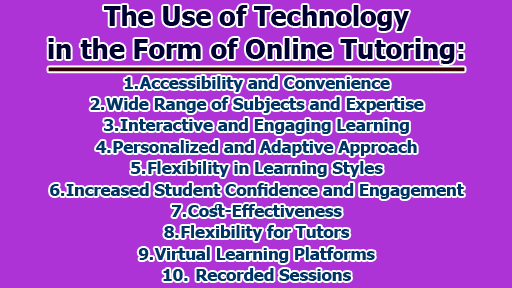The Use of Technology in the Form of Online Tutoring:
Online tutoring has become increasingly popular and widely used in recent years, revolutionizing the way students receive academic support and assistance. This form of technology-driven education leverages the power of the internet and digital tools to connect students with qualified tutors remotely, allowing for convenient and flexible learning experiences. Here, we will delve into the details of the use of technology in the form of online tutoring.
1. Accessibility and Convenience: One of the key advantages of online tutoring is its accessibility. Students can access tutoring services from anywhere, as long as they have a reliable internet connection. This eliminates geographical limitations and allows students to connect with tutors who may be located in different cities, countries, or even continents. Additionally, online tutoring offers convenience in terms of scheduling. Students can arrange tutoring sessions at times that suit their individual needs, without the constraints of fixed physical locations or commuting time.
2. Wide Range of Subjects and Expertise: Online tutoring platforms cater to a wide range of subjects and academic levels, spanning from elementary school to university and beyond. Students can find tutors specialized in various subjects, including mathematics, science, languages, history, and more. This breadth of expertise ensures that students can receive tailored instruction in their specific areas of need, regardless of their location or the availability of local tutors.
3. Interactive and Engaging Learning: Online tutoring platforms employ various interactive tools and technologies to create engaging learning experiences. Tutors can use real-time whiteboards, video conferencing, screen sharing, and collaborative online platforms to explain concepts, solve problems, and engage students in active learning. These tools allow for visual representation, instant feedback, and interactive discussions, enhancing the overall learning experience and promoting better understanding.
4. Personalized and Adaptive Approach: Online tutoring enables a personalized and adaptive approach to education. Tutors can assess the individual learning needs, strengths, and weaknesses of each student and tailor their instruction accordingly. They can provide one-on-one attention, focus on specific areas of improvement, and design customized learning plans. Furthermore, many online tutoring platforms leverage data analytics and artificial intelligence algorithms to track student progress, identify areas of struggle, and recommend appropriate resources or interventions for targeted learning.
5. Flexibility in Learning Styles: Every student has unique learning preferences and styles. Online tutoring allows for flexibility in accommodating different learning modalities. Tutors can adapt their teaching strategies to align with a student’s preferred learning style, whether it be visual, auditory, or kinesthetic. They can also provide additional resources, such as videos, interactive simulations, or practice exercises, to cater to diverse learning needs and enhance comprehension.
6. Increased Student Confidence and Engagement: Online tutoring fosters a comfortable and supportive learning environment. Students often feel less intimidated in a one-on-one virtual setting compared to a traditional classroom or group setting. This can lead to increased confidence, active participation, and higher engagement levels. With the tutor’s undivided attention and personalized guidance, students are more likely to ask questions, seek clarification, and take ownership of their learning process.
7. Cost-Effectiveness: Online tutoring can be more cost-effective compared to in-person tutoring. Traditional tutoring often involves additional expenses, such as transportation costs or the need to find local tutors who may charge higher fees due to limited availability. In contrast, online tutoring eliminates these extra costs, making quality education more accessible and affordable for a wider range of students.
8. Flexibility for Tutors: Online tutoring also offers benefits for tutors. They have the flexibility to set their own schedules, work from anywhere, and reach a global audience. This flexibility can attract highly qualified tutors who may prefer the freedom and convenience of remote teaching. It also allows tutors to connect with students from diverse backgrounds and cultures, contributing to a more enriching educational experience.
9. Virtual Learning Platforms: Online tutoring relies on virtual learning platforms that serve as a central hub for tutors and students to connect and interact. These platforms often include features like video conferencing tools, chat functions, file sharing capabilities, and digital whiteboards. They provide a seamless and user-friendly interface for tutors and students to collaborate in real-time, mimicking the face-to-face tutoring experience.
10. Recorded Sessions: One advantage of online tutoring is the ability to record tutoring sessions. These recordings can be beneficial for students to review later, allowing them to revisit concepts, explanations, and problem-solving techniques. Recorded sessions also serve as a valuable resource for parents or guardians to stay informed about their child’s progress and understand the areas that may require additional attention.
11. Supplemental Learning Materials: Online tutoring platforms often offer a wealth of supplemental learning materials to complement the tutoring sessions. These materials may include e-books, practice worksheets, quizzes, interactive learning games, and educational videos. Tutors can recommend specific resources based on a student’s needs and provide access to a wide range of educational materials to support their learning journey.
12. 24/7 Availability: Online tutoring can provide round-the-clock availability, catering to students in different time zones or those with varying schedules. Some platforms offer tutoring services 24/7, allowing students to seek assistance whenever they need it, even during weekends or holidays. This flexibility ensures that students can receive support promptly, leading to efficient problem-solving and knowledge retention.
13. Global Tutoring Network: One of the significant advantages of online tutoring is the ability to connect with tutors from around the world. Students have access to a global tutoring network, allowing them to find tutors with specific expertise or language proficiency. This global reach broadens students’ perspectives, exposes them to diverse teaching styles, and fosters a multicultural learning environment.
14. Parental Involvement: Online tutoring facilitates increased parental involvement in a student’s education. Parents can monitor their child’s progress, attend virtual meetings with tutors, and gain insights into their child’s learning needs and performance. This transparency strengthens the parent-tutor-student partnership, ensuring that all stakeholders are actively engaged in supporting the student’s educational journey.
15. Enhanced Communication and Feedback: Online tutoring platforms provide various communication channels that enable ongoing interaction between tutors, students, and parents. Tutors can provide regular feedback on a student’s performance, identify areas for improvement, and suggest strategies for continued progress. Students can ask questions, seek clarification, and receive immediate feedback, fostering a dynamic and responsive learning environment.
16. Test Preparation and Exam Support: Online tutoring is particularly beneficial for test preparation and exam support. Tutors can help students navigate through specific exam formats, provide targeted strategies, and offer practice sessions that simulate real exam conditions. Online platforms may also include access to past exam papers, study guides, and resources to assist students in achieving their academic goals.
17. Specialized Tutoring Services: Online tutoring caters to a wide range of specialized needs. Students with learning disabilities or special educational requirements can find tutors experienced in supporting their unique challenges. Additionally, online platforms offer language tutoring, college application guidance, career counseling, and other specialized services, ensuring comprehensive educational support for students at different stages of their academic journey.
18. Data-Driven Insights: Online tutoring platforms often employ data analytics and tracking systems to monitor student progress and performance. Tutors can assess students’ strengths, weaknesses, and learning patterns through data-driven insights. This information helps tutors make informed instructional decisions, adjust their teaching strategies, and provide targeted interventions to maximize student learning outcomes.
19. Gamification and Interactive Learning: Technology enables online tutoring platforms to incorporate gamification elements and interactive learning techniques. Tutors can utilize educational games, quizzes, and interactive simulations to make the learning process more engaging and enjoyable. Gamification motivates students to actively participate, compete with themselves or others, and earn rewards or achievements, thereby enhancing their overall learning experience.
20. Collaboration and Peer Learning: Online tutoring platforms facilitate collaboration and peer learning opportunities. Tutors can organize group sessions or pair students with similar learning needs to work together on projects, assignments, or problem-solving tasks. Collaborative activities promote teamwork, communication skills, and the exchange of ideas, fostering a supportive and interactive learning community among students. Through peer learning, students can benefit from different perspectives, learn from each other, and develop a deeper understanding of the subject matter.
It is apparent that the use of technology in online tutoring has revolutionized the way students receive academic support and instruction. Through virtual learning platforms, interactive tools, and personalized approaches, online tutoring offers accessibility, convenience, and a wide range of subjects. Students can access quality education from anywhere, at any time, connecting with qualified tutors from around the world. The flexibility, interactive learning experiences, and personalized instruction foster student engagement, confidence, and academic success. Moreover, technology enables data-driven insights, gamification, and collaboration, further enhancing the learning process. As technology continues to advance, online tutoring is poised to play an increasingly vital role in shaping the future of education, making quality learning accessible to learners of all backgrounds. With its myriad benefits and transformative potential, the use of technology in online tutoring is set to pave the way for a more inclusive, interactive, and effective educational landscape.
FAQs:
What equipment or technology do I need for online tutoring?
To engage in online tutoring, you typically need a computer or laptop with a reliable internet connection. Additionally, a webcam, microphone, and headset can enhance the interactive experience during video conferencing sessions. Some online tutoring platforms may also require specific software or applications to facilitate communication and collaboration.
How do online tutors communicate with students?
Online tutors communicate with students through various means, including video conferencing tools, chat functions, and email. Video conferencing allows for real-time interaction, enabling tutors to explain concepts, demonstrate problem-solving techniques, and engage in discussions. Chat functions and email are commonly used for asynchronous communication, allowing tutors to provide feedback, answer questions, and share resources outside of scheduled sessions.
How do online tutors assess student progress and provide feedback?
Online tutors can assess student progress through various methods. They may assign and review practice exercises, quizzes, or assignments, which students can submit electronically. Tutors can also utilize interactive platforms with built-in assessment features or provide real-time feedback during video sessions. Additionally, tutors may use data analytics and tracking systems to monitor student performance, identify areas of improvement, and provide tailored feedback based on the analysis of student data.
Are online tutoring sessions recorded?
Many online tutoring platforms offer the option to record tutoring sessions. Recording sessions allows students to revisit the material covered, review explanations, and reinforce their understanding. It can also serve as a resource for parents or guardians to stay informed about their child’s progress and actively participate in their educational journey.
How do online tutors address individual learning needs?
Online tutors can address individual learning needs by conducting assessments or diagnostics to understand a student’s strengths and weaknesses. Based on this information, tutors develop personalized learning plans and tailor their instruction to meet the specific needs of each student. They can provide additional resources, offer alternative explanations, and adapt teaching strategies to accommodate different learning styles.
Can online tutoring be as effective as in-person tutoring?
Online tutoring has proven to be highly effective and, in some cases, can be as effective as in-person tutoring. The use of technology, interactive tools, and personalized instruction allows for meaningful learning experiences. However, the effectiveness of online tutoring can depend on various factors, such as the quality of the tutor-student interaction, the level of student engagement, and the suitability of the online platform used. Additionally, individual learning preferences and the subject matter being taught can also influence the efficacy of online tutoring.
Is online tutoring suitable for all subjects and grade levels?
Online tutoring is suitable for a wide range of subjects and grade levels. It encompasses various academic disciplines, including mathematics, science, languages, humanities, and test preparation. Online tutoring platforms often have a diverse pool of tutors with specialized expertise, ensuring that students can find suitable support regardless of their subject or grade level.
Can online tutoring replace traditional classroom education?
Online tutoring complements traditional classroom education but is not designed to replace it entirely. While online tutoring offers personalized instruction and flexibility, traditional classrooms provide social interaction, hands-on activities, and a structured learning environment. The combination of both approaches can provide a well-rounded educational experience, catering to different learning needs and maximizing student learning outcomes.
How can I ensure the safety and security of online tutoring?
When engaging in online tutoring, it is important to prioritize safety and security. Choose reputable online tutoring platforms that prioritize privacy and data protection. Verify the qualifications and background of tutors before engaging in sessions. Additionally, ensure that communication channels are secure, and encourage students to report any inappropriate or concerning behavior. Following these precautions can help create a safe and secure online tutoring environment.
Can online tutoring be affordable for students?
Online tutoring can often be more affordable compared to in-person tutoring. The elimination of travel costs, the ability to choose from a global pool of tutors, and the flexibility to select session durations can contribute to cost savings. Additionally, many online tutoring platforms offer different pricing options, including package deals, discounted rates, or pay-as-you-go models, making quality education more accessible and affordable for a wider range of students.

Library Lecturer at Nurul Amin Degree College










